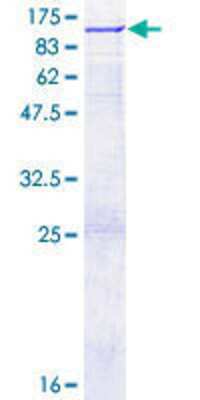OS9: Proteins and Enzymes
OS9 is a lectin which functions in endoplasmic reticulum quality control and ER-associated degradation. This ER glycoprotein is found in the intralumenal level and highly expressed in tumor tissue. The OS9 gene is transcriptionally induced upon activation of the Ire1/Xbp1 ER-stress pathway.
Functionally, OS9 binds to HIF-1, a key regulator of the hypoxic response and angiogenesis, and promotes the degradation of one of its subunits. It may also bind terminally misfolded non-glycosylated proteins as well as improperly folded glycoproteins, retain them in the ER, and possibly transfer them to the ubiquitination machinery and promote their degradation. One such possible target includes TRPV4.
Show More
Functionally, OS9 binds to HIF-1, a key regulator of the hypoxic response and angiogenesis, and promotes the degradation of one of its subunits. It may also bind terminally misfolded non-glycosylated proteins as well as improperly folded glycoproteins, retain them in the ER, and possibly transfer them to the ubiquitination machinery and promote their degradation. One such possible target includes TRPV4.
3 results for "OS9 Proteins and Enzymes" in Products
3 results for "OS9 Proteins and Enzymes" in Products
OS9: Proteins and Enzymes
OS9 is a lectin which functions in endoplasmic reticulum quality control and ER-associated degradation. This ER glycoprotein is found in the intralumenal level and highly expressed in tumor tissue. The OS9 gene is transcriptionally induced upon activation of the Ire1/Xbp1 ER-stress pathway.
Functionally, OS9 binds to HIF-1, a key regulator of the hypoxic response and angiogenesis, and promotes the degradation of one of its subunits. It may also bind terminally misfolded non-glycosylated proteins as well as improperly folded glycoproteins, retain them in the ER, and possibly transfer them to the ubiquitination machinery and promote their degradation. One such possible target includes TRPV4.
Show More
Functionally, OS9 binds to HIF-1, a key regulator of the hypoxic response and angiogenesis, and promotes the degradation of one of its subunits. It may also bind terminally misfolded non-glycosylated proteins as well as improperly folded glycoproteins, retain them in the ER, and possibly transfer them to the ubiquitination machinery and promote their degradation. One such possible target includes TRPV4.
| Applications: | AC |
| Applications: | AC |
| Applications: | WB, ELISA, MA, AP |

